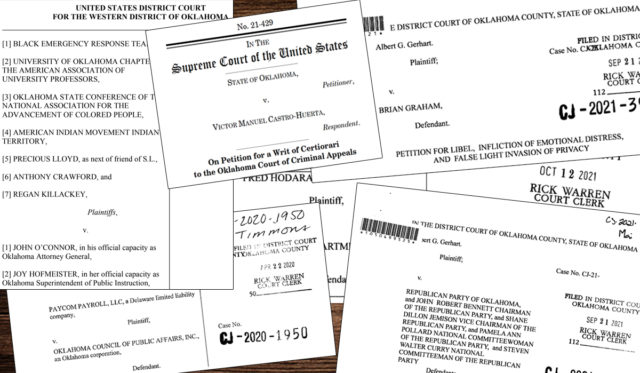
Lawsuits come, lawsuits go and lawyers make money. In the state of Oklahoma, several high-profile lawsuits have been working their way through district and appellate courts at both the state and federal level.
Keeping tabs on all the filings, responses and rulings can be incredibly time-consuming and difficult, even for professional newsrooms.
This week, our team summarized a handful of noteworthy lawsuits involving state government, tribal sovereignty, influential organizations and interesting individuals.
Below, catch up on several key court cases worth watching.
Retired attorney sues for Oklahoma DOC records
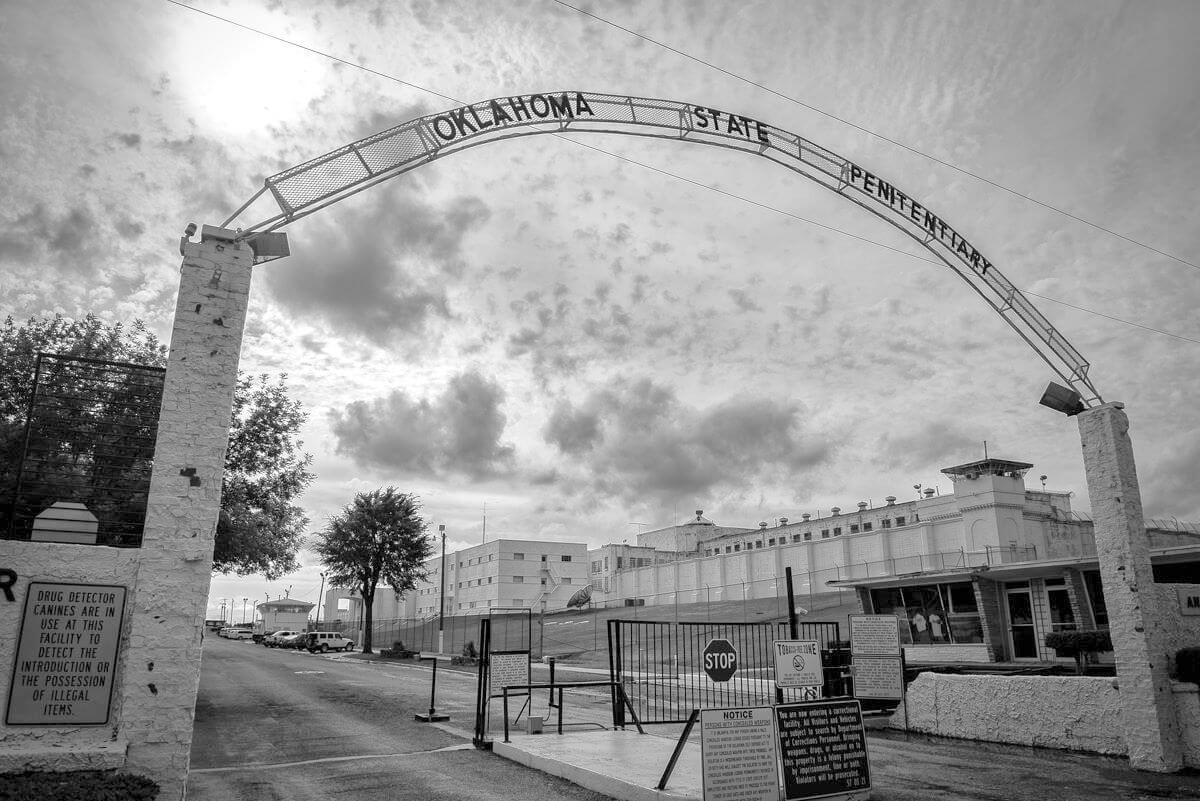
A lawsuit filed against the Oklahoma Department of Corrections on Oct. 13 alleges the department has not complied with open records requests regarding the state’s execution plans for inmates on death row.
Fred Hodara, a retired criminal defense attorney from New York, filed the lawsuit after requesting documentation from the Department of Corrections on its drug inventories, records containing expiration dates of those drugs, the purchase of drugs to be used in executions and testing records of the drugs.
After a six-year pause, Oklahoma is set to resume executions in the coming weeks. John Grant is scheduled to be executed Thursday, Oct. 28. Julius Jones, who has been the subject of a public campaign for clemency, is scheduled to be executed Nov. 18. Grant was convicted of the murder of a prison worker in 1998. Jones was convicted of the 1999 murder of Edmond resident Paul Howell.
Hodara told the Associated Press he decided to file his lawsuit following previous executions that were plagued by issues regarding the administered drugs.
“After all that happened in that 2014, 2015 and 2016 period with the botched executions, people like myself and all over the country were focused on what had gone wrong and the lack of transparency and accountability,” Hodara said. “I simply wanted to know through the Open Records request what has changed, how they’re going to do this in an accountable way with good governance.”
Amicus briefs filed in challenges to SCOTUS reservation ruling

Friday, four amicus briefs were filed in support of Gov. Kevin Stitt’s lawsuit seeking to overturn the U.S. Supreme Court decision in McGirt v. Oklahoma.
The first amicus brief was filed by the cities of Tulsa and Owasso. The second came from a collection of law enforcement groups — including the Oklahoma District Attorneys Association, the Oklahoma Sheriffs Association, the Association of Oklahoma Narcotic Enforcers and 27 district attorneys.
The third amicus brief was filed by Oklahoma business groups — including the Environmental Federation of Oklahoma, Inc., the Oklahoma Farm Bureau Legal Foundation, the Oklahoma Cattlemen’s Association, the Oklahoma Aggregates Association and the Petroleum Alliance of Oklahoma.
The fourth amicus brief was filed by the states of Texas, Kansas, Louisiana and Nebraska.
On Sept. 17, the state filed a petition for certiorari to the Supreme Court in the criminal appellate case of Victor Manuel Castro-Huerta. The four amicus briefs filed Friday are in support of the state’s petition, which argues that the state has concurrent criminal jurisdiction over non-Indians who victimize Indigenous citizens within Indian Country. The state of Oklahoma’s petition asks whether a state has authority to prosecute non-Indians who commit crimes against Indians in Indian Country and whether the SCOTUS decision in McGirt v. Oklahoma “should be overruled.”
The Cherokee Nation is expected to submit an amicus brief in the Castro-Huerta case this week and has scheduled a media briefing Friday. The Supreme Court must file a response to the petition by Nov. 22.
The state of Oklahoma is also pursuing other challenges to the McGirt ruling, including in the criminal case of Johnny Edward Mize II. The Muscogee Nation filed its own amicus brief in the case on Oct. 5.
Oklahoma Supreme Court blocks 3 abortion restrictions, for now
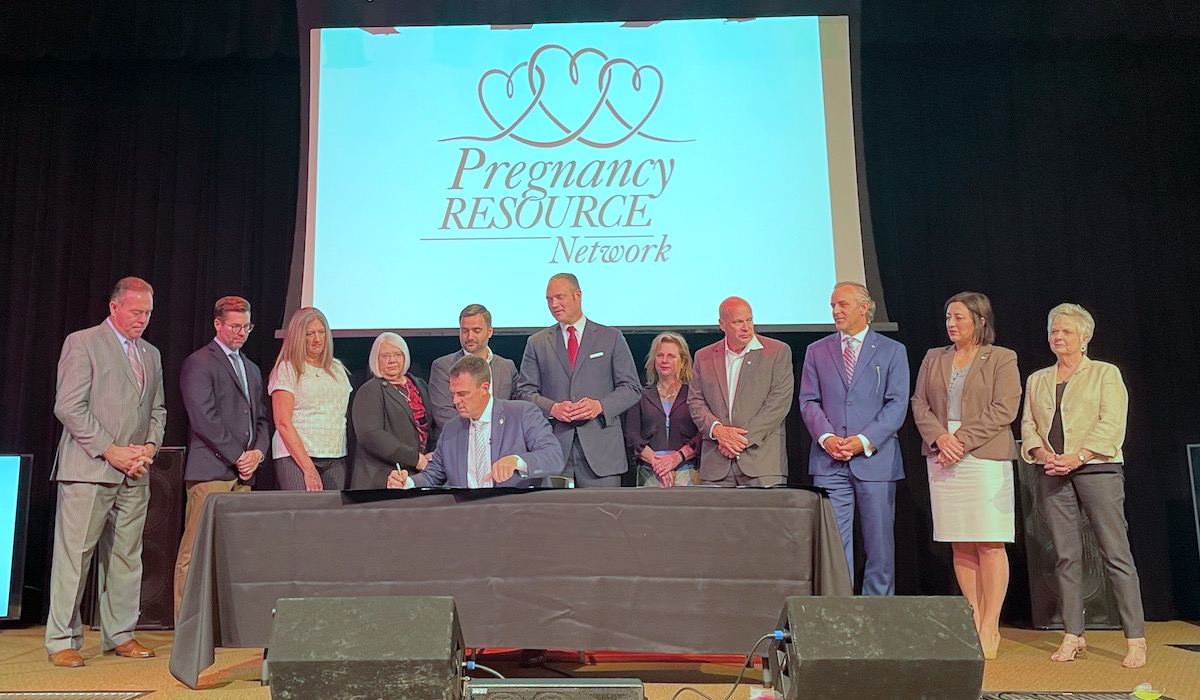
On Tuesday, the Oklahoma Supreme Court ordered a temporary injunction that will block three abortion laws from taking effect Nov. 1 following a lawsuit challenging the constitutionality of five abortion restrictions signed into law by Gov. Kevin Stitt this year.
The lawsuit, filed by reproductive rights activists in September, claims the laws being challenged are “unconstitutional and contrary to clear Oklahoma Supreme Court precedent.”
The restrictions blocked by the Oklahoma Supreme Court this week include HB 1904, which would require physicians performing abortions in the state to specialize in obstetrics and gynecology, and SB 778 and SB 779, which contain restrictions on medication abortion and an ultrasound requirement.
Earlier this month, an Oklahoma County District Court judge blocked two of the five abortion laws, including HB 1102, which categorizes the performance of an abortion as “unprofessional conduct” for a physician, and HB 2441, which prohibits an abortion once a fetal heartbeat is detected.
The lawsuit was filed by the Center for Reproductive Rights, Planned Parenthood Federation of America, Dechert LLP, and Blake Patton on behalf of the Oklahoma Call for Reproductive Justice, Tulsa Women’s Reproductive Clinic, Dr. Alan Braid, Comprehensive Health of Planned Parenthood Great Plains and Planned Parenthood of Arkansas and Eastern Oklahoma.
President and CEO of the Center for Reproductive Rights Nancy Northup released a statement in a press release following Tuesday’s ruling.
“The Oklahoma Supreme Court recognized that these laws would cause irreparable harm to Oklahomans,” Northup said. “All of these laws have the same goal: to make it harder to get an abortion in Oklahoma. We will continue to fight in court to ensure these laws are struck down for good. Politicians should not be meddling in the private health decisions of Oklahomans.”
American Civl Liberties Union files lawsuit over HB 1775
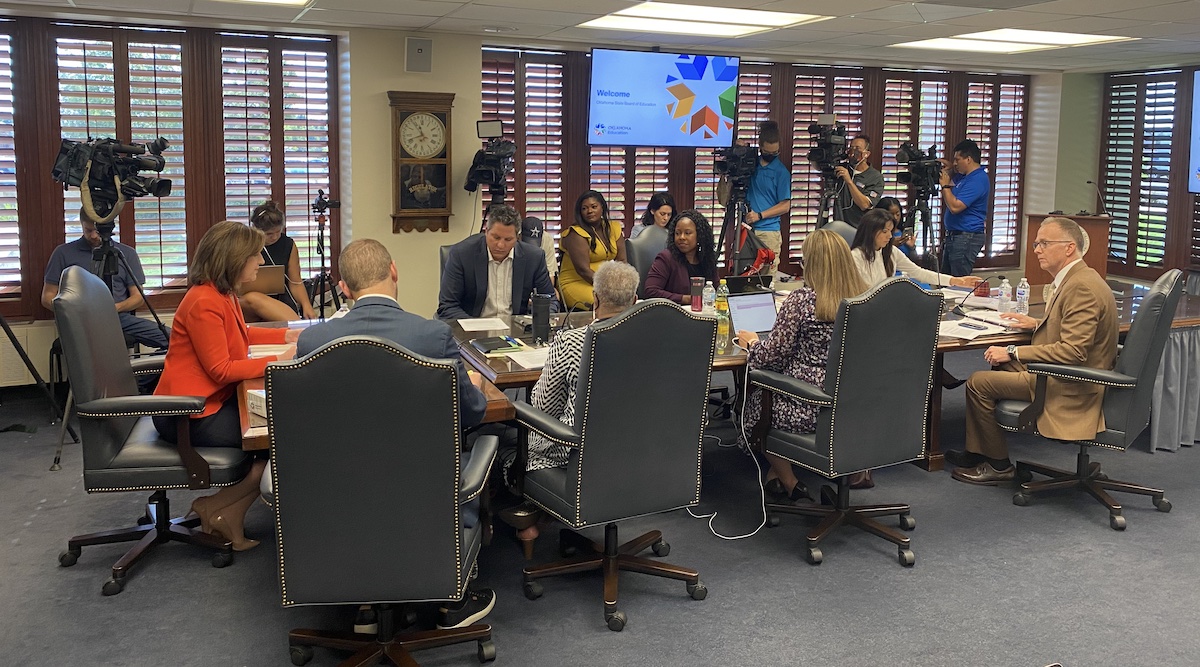
A lawsuit regarding HB 1775, which bans teaching certain concepts about race and gender in Oklahoma public schools, was filed by the American Civil Liberties Union in the U.S. District Court for the Western District of Oklahoma last week. The suit contends that the bill is unconstitutional under the First and 14th Amendments and requests that the court issue injunctive relief prohibiting enforcement of the legislation.
The lawsuit claims HB 1775 “severely restricts discussions on race and gender in Oklahoma’s elementary, secondary and higher education schools without any legitimate pedagogical justification, using language that is simultaneously sweeping and unclear.” It also alleges that educators at all levels are blacklisting books by diverse authors to avoid raising complex questions about race and gender in the classroom.
The lawsuit states that Edmond Public Schools, in an effort to comply with HB 1775, has prohibited teachers from using the terms “diversity and “white privilege” and has struck texts including To Kill a Mockingbird, I Know Why the Caged Bird Sings, Narrative of the Life of Frederick Douglass and A Raisin in the Sun from reading lists.
A high school teacher in Millwood Public Schools named as a plaintiff in the lawsuit, Anthony Crawford, structures courses to include multiple viewpoints in order to stimulate student debate. However, the lawsuit says, owing to HB 1775’s vague nature, Crawford is unclear whether he can expose students to certain viewpoints and theories that are relevant to the public discussion of contemporary issues.
HB 1775 was signed by Gov. Kevin Stitt in May and has been called a ban on “critical race theory” by both critics and supporters.
The bill prohibits Oklahoma public school teachers from teaching that “any individual, by virtue of his or her race or sex, is inherently racist, sexist or oppressive, whether consciously or unconsciously,” that “any individual should feel discomfort, guilt, anguish or any other form of psychological distress on account of his or her race or sex” or that “meritocracy or traits such as a hard work ethic are racist or sexist or were created by members of a particular race to oppress members of another race.”
The State Board of Education adopted emergency rules requiring public school districts to develop a process to submit complaints and to investigate all legally sufficient complaints.
In response to the lawsuit filing, Oklahoma Attorney General John O’Connor posted on Twitter that he looks forward to defending HB 1775 “against these activists who do not share our Oklahoma values.”
State Secretary of Education Ryan Walters also posted on Twitter in support of O’Connor and Stitt’s fight against what he calls a “frivolous lawsuit”
The lawsuit was filed Oct. 19 by the ACLU, ACLU of Oklahoma, the Lawyers Committee for Civil Rights Under Law and Schulte Roth & Zabel LLP on behalf of the Black Emergency Response Team, University of Oklahoma Chapter of the Association of University Professors, the Oklahoma State Conference of the National Association for the Advancement of Colored People, the American Indian Movement Indian Territory, a high school student and high school teachers Anthony Crawford and Regan Killackey.
Defendants in the lawsuit include Stitt; O’Conner; State Superintendent of Public Instruction Joy Hofmeister; State Board of Education members William Flanagan, Carlisha Bradley, Jennifer Monies, Estella Hernandez, Brian Bobek and Trent Smith; members of the Oklahoma State Regents for Higher Education, members of the University of Oklahoma Board of Regents, Edmond Public Schools Superintendent Angela Grunewald and members of the Edmond Public Schools Board of Education.
Paycom lawsuit against OCPA revived by court
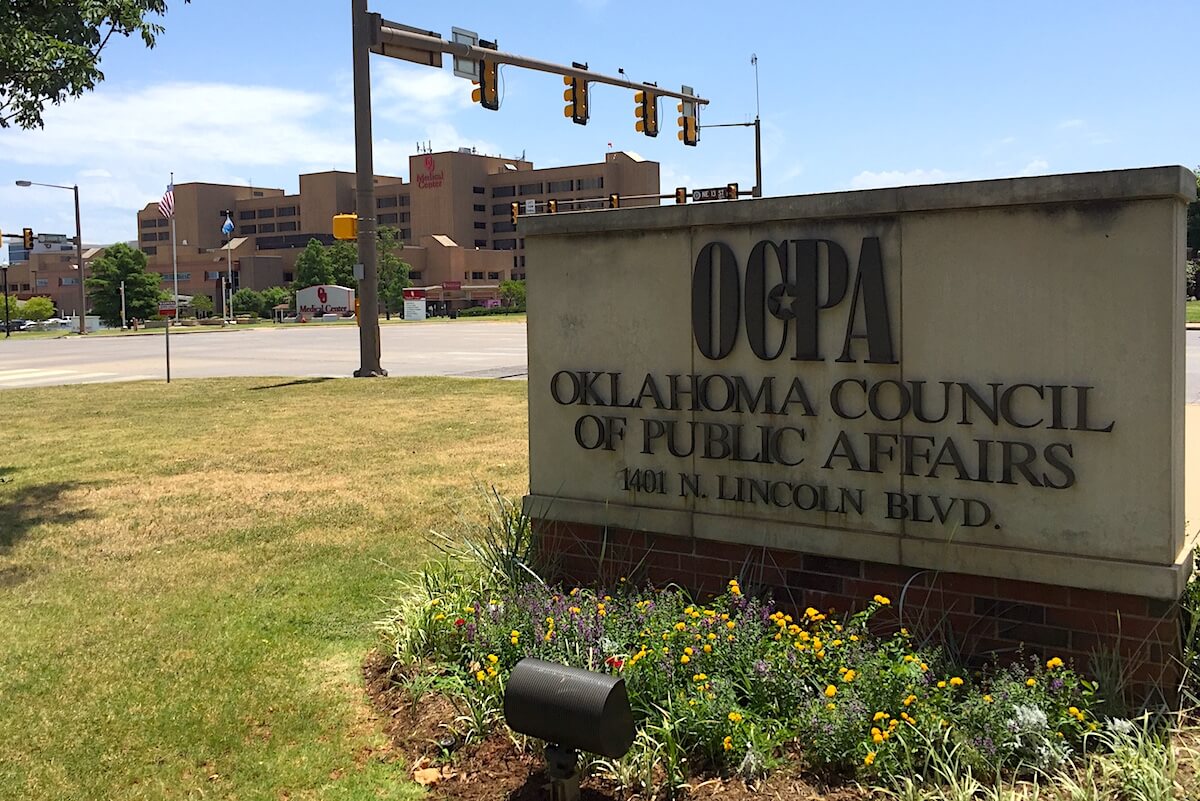
In March 2020, Paycom CEO Chad Richison wrote two open letters to Gov. Kevin Stitt, encouraging Stitt to take more stringent action to combat the spread of COVID-19. He called for the governor to coordinate with businesses to ensure safe conditions and said the government’s COVID plan should “innovate how grocery stores operate by providing drive-thru pick up or delivery for all customers and encouraging the use of technology” and “temporarily suspend personal-touch services in order to adhere to social distancing, which includes, but is not limited to, hair salons, nail salons, spas and massage parlors.”
Soon after, the Oklahoma Council of Public Affairs published an article that referenced Richison’s letters, saying, “Some individuals have called for Stitt to order most businesses to close and have the government control how others operate, including grocery stores. Chad Richison, CEO of Paycom, is among those who have advocated such actions.”
In response, on April 22, 2020, Paycom sued OCPA for defamation and tortious interference, saying OCPA had misrepresented Richison’s statements, since he did not call for “most businesses to close” and that the misrepresentation hurt Paycom’s reputation among its customers.
Oklahoma County District Judge Thomas E. Prince dismissed the case Aug. 14, 2020, saying Paycom had not demonstrated that it suffered damages “with the necessary specificity” and referring to Oklahoma’s Anti-SLAPP law, which is meant to prevent the use of lawsuits, or the threat of lawsuits, to stifle free speech.
As a quick scroll through the seemingly endless list of events in the case illustrates, Prince’s decision would not be the end of Paycom v. OCPA. Paycom soon filed an amended petition, which Prince dismissed on Dec. 30, 2020. In the meantime, OCPA filed a motion to make Paycom pay attorneys’ fees and other expenses, and the two have been engaged in a convoluted back-and-forth ever since.
A recent twist in the case promises to keep it alive even longer. On Oct. 18, the Oklahoma Supreme Court ruled that the dismissal of the amended petition was invalid because it did not occur within 30 days of the hearing of the motion to dismiss, which took place on Nov. 20, 2020. Paycom’s amended petition is, therefore, alive and well and back in district court.
OCPA’s first request for attorney’s fees, filed on Sept. 11, 2020, asked for a total of $100,292.86. Its latest amended request, filed Oct. 15, says the amount has now risen to $808,462.25.
Al Gerhart’s pair of lawsuits allege libel, sabotage
If a political activist suing a political party gets you excited, then buckle up for Al Gerhart v. The Republican Party of Oklahoma, John Robert Bennett, et al.
Gerhart, a conservative firebrand who operates the Sooner Tea Party newsletter and routinely publishes criticisms of and allegations against elected officials, sued the OKGOP, Chairman John Bennett, Vice Chairman Shane Jemison and national committeepersons Pam Pollard and Steve Curry on Sept. 21.
Among other requests, Gerhart — who also claims Bennett and his staff are covering up sexual harassment allegations — is seeking injunctive relief to have himself added back to the OKGOP email list and to prevent party officials from “wrongfully defaming or casting false light upon” him. Gerhart is also seeking actual and punitive damages in excess of $250,000, plus attorney fees. (Gerhart filed his petition pro se, meaning he is ineligible to recoup attorney fees.)
According to his lawsuit, Gerhart’s beef with Bennett and other party leaders dates back to at least June 24 when “a mass email” from the OKGOP’s communications director was sent “to sabotage a survey that [Gerhart] was conducting that was aimed at the 2021 Oklahoma GOP State Convention delegates in order to gauge their views and interests in party issues.”
Gerhart also alleges a “wrongful closing of the July 17 state (GOP) committee meeting to visitors and interested parties,” which he says violated OKGOP bylaws. Despite the party leaders’ decision to prohibit media from attending, the July 17 meeting made national news owing to a vote to censure U.S. Sen. Jim Inhofe and U.S. Sen. James Lankford. (The censure resolution failed.)
In his petition, Gerhart says the OKGOP’s public relations officer posted a message in the Sooner Politics Facebook group July 18 “admitting that she had wrongfully conspired with Chairman John Bennett and executive director Bob Dani to close off ‘all access’ to [Gerhart].”
Attorney A.J. Ferate responded to the lawsuit Oct. 6 on behalf of Jemison, Pollard and Curry, writing that Gerhart “fails to state a justiciable claim.”
“As Mr. Gerhart is not a member of the party’s governing body, the Oklahoma Republican Party State Committee, he does not possess standing to bring claims against the internal governing Oklahoma Republican Party decisions or its individual officers,” Ferate writes.
Ferate’s 14-page response and motion to dismiss then argues that a political party is protected from “undue exterior influence from governmental entities” owing to protections afforded by the First Amendment.
Gerhart, of course, has benefited from First Amendment protections before, when his 2014 conviction for felony blackmail was overturned by the Oklahoma Court of Criminal Appeals. Oklahoma County District Attorney David Prater’s office had convinced a jury to convict Gerhart for blackmail and a computer crime related to an email he sent to then-Sen. Cliff Branan threatening that if Branan did not agree to hear a certain bill Gerhart and others would “dig into your past, yoru (sic) family, your associates and once we start on you there will be no end to it.”
While Gerhart, a carpenter, walked close to the cliff(s) in that saga, he referenced the ordeal in a separate lawsuit he also filed pro se on Sept. 21 alleging libel, infliction of emotional distress and false light invasion of privacy against former legislative candidate Brian Graham.
In his petition in the Graham lawsuit, Gerhart alleges that on July 10 Graham “wrongfully posted an ‘anonymous’ letter on Facebook on the Sooner Politics Facebook group page” that “wrongfully made horrific allegations of child sex trafficking and the abuse of women and other scurrilous attacks such as calling [Gerhart] a sociopath, atheist and a litany of other insults with the intention of wrongfully labeling [Gerhart] as an abusive person.”
Gerhart’s summary of the letter continues:
The third paragraph in the letter or jpeg of the letter claimed that the plaintiff made trips to the Philippines where indeed the plaintiff does have a small factory. The letter then brings up the Philippines being well known for sex trafficking of women and children and claims that the plaintiff talks of ‘my little girls’ without offering any proof, with the obvious wrongful intention of casting false light upon the plaintiff and inferring he is a sex trafficker.
Gerhart alleges that Graham posted in the Facebook comment section of the original post: “For what it’s worth though Al, it is a blatant attack with a bunch of half truths and insults.” Gerhart writes that another comment asked why Graham posted the information if he knew it was not completely factual, to which Graham allegedly replied: “I posted it because I knew if Al hadn’t seen it it would irritate the hell out of him and I was curious who was buying his BS these days and who’d defend him.” Gerhart says Graham also wrote, “If you weren’t an asshole I would have sent this to you personally and privately.”
Gerhart also alleges that Graham “wrongfully posted a ‘meme’ picture with the word ‘live’ at the top and near the bottom a ‘breaking news’ text box containing this statement ‘Oklahoma Man at Gloryhole Outraged That Holes Were Too Tall For Him.’” Gerhart’ says his photo was included in the meme.
Gerhart writes in his petition that the letter Graham posted was reposted across several Facebook groups and that Graham “later posted again responding to the news that he had been sent a demand letter.” Gerhart writes that Graham posted, “It turns me on when you are irritated” and made reference to former Sen. Ralph Shortey who is serving federal prison time related to a sexual encounter with a minor.
“[Graham] continues to post the libelous letter on Facebook in order to harass [Gerhart] and to damage his reputation and likely will not stop until enjoined by a court of law,” Gerhart writes, requesting injunctive relief from the court and actual and punitive damages exceeding $1 million.
According to OSCN, Graham has yet to be served with the lawsuit after a summons was returned.
(Editor’s note: Chad Richison is a donor to the Sustainable Journalism Foundation, which operates NonDoc. The ACLU of Oklahoma is a 2021 sponsor of the Sustainable Journalism Foundation.)





















